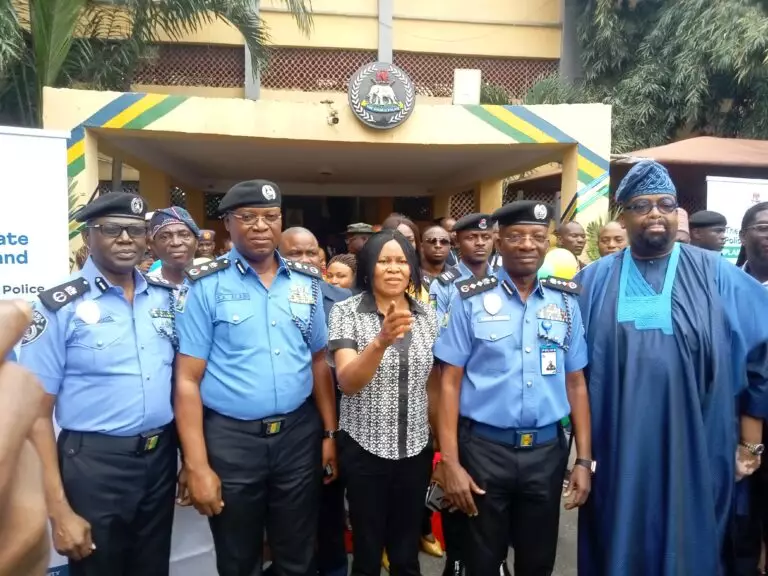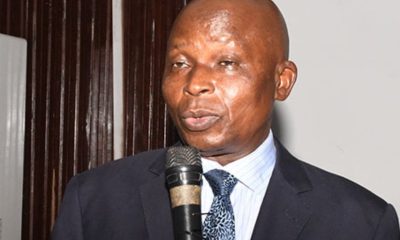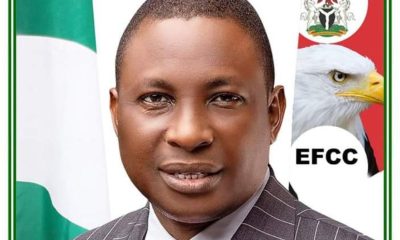News
We’ve taken steps to check insecurity on highways – I-G

(Photo: L-R CP Idowu Owohunwa of Lagos Command, DIG Abiodun Alabi, Mrs Joe Okei-Odumakin, Acting I-G Kayode Egbetokun, and Mr Olumide Akpata during Complainants Response Unit inauguration at Lagos State Police Command Headquarters, Ikeja, on Wednesday)
The Acting Inspector-General of Police, Mr Kayode Egbetokun, says the force has taken steps to check insecurity on highways, particularly Abuja-Kaduna Highway.
Egbetokun disclosed this during his first official to Lagos State Police Command on Wednesday where he inaugurated some projects, including Complainants Response Unit (CRU).
“Since I came into office, we have taken steps to do a number of things to ensure crime is reduced to the barest minimum and security restored to troubled areas.
” On the Abuja-Kaduna Road you are talking about, we have taken necessary steps to rid it of criminal elements that were terrorising motorists.
” Very soon, you are going to be seeing results. We are embarking on establishment of a Special Intervention Squad (SIS). We have started mobilisation to make success of it,” he said.
Egbetokun said the SIS would soon become operational in the states that had been chosen as pilot areas.
On police welfare, he said he had President Bola Tinubu’s assurance that efforts were underway to improve the welfare of police officers and men.
On when the police would have a vibrant forensic department to detect criminals, Egbetokun said: “We are going to take these things one after the other.
“Today, we have launched the CRU aimed at promoting transparency in the police.
“We want to build confidence in the members of the public. We want to enhance police/ community collaboration, and the CRU is needed to achieve all of these.
“At least, now, members of the public who have complaints against the police have a place to lodge their complaints.”
Egbetokun assured Nigerians that the force would make the CRU functional in all the states of the federation.
“Lagos State has started. We just inaugurated that one today. We inspected the facilities and they are excellent.
“Officers that would be deployed to man the CRU will be carefully selected – officers with impeccable integrity.
“They will be well motivated, with opportunities for training overseas, if necessary,” he said.
At the event, Mr Femi Falana (SAN) warned the officers and men of the Nigeria Police Force against torture and illegal detention of suspects.
Falana said that under the Police Act, 2020, the officers and men would be held responsible and prosecuted for illegal detention.
Falana, however, assured the officers and men of free legal services should they have need of it.
He promised to build CRU in four states.
A former President of the Nigeria Bar Association and one of those that built the CRU in Lagos, Mr Olumide Akpata, promised to do same in Edo and Delta states.
He expressed optimism that the unit would enhance better relationship between the police and the public.
News
Woman killed while crossing road in Anambra

The Federal Road Safety Corps (FRSC), Anambra State Sector Command, has confirmed the death of a woman in an accident at Okpoko Market on the Asaba-Onitsha Road.
The Sector Commander, Mr Adeoye Irelewuyi, who confirmed the accident to journalists in Awka on Thursday, said that the woman was hit while she was crossing the road.
He said that the accident, which occurred on Wednesday, involved a commercial tow truck with registration number XA550BMA.
“Eyewitness report reaching us indicates that the truck was towing a vehicle in an uncontrollable speed along the axis.
“The vehicle that was being towed got detached from the tow truck.
“It hit and killed a female adult, who was said to be crossing the road, while the tow truck continued its movement.
“FRSC rescue team came to the scene and took the woman to Toronto Hospital, Onitsha, where she was confirmed dead and her body deposited at the hospital’s mortuary,” he said.
While sympathising with the family of the dead, the sector commander urged motorists, especially tow truck drivers, to exercise a high level of professionalism.
He also urged the drivers to always use standard equipment and avoid speeding.
News
LASG’s maize palliative impactful, says poultry association chair

The Chairman, Poultry Association of Nigeria (PAN), Lagos State Chapter, Mr Mojeed Iyiola, said the state government’s maize palliative to members of the association made a positive impact on the sector.
Iyiola said this in an interview with the News Agency of Nigeria (NAN) on Thursday in Lagos.
“We received about 150,000 tons of maize in February from the Lagos State government as palliative to cushion the effect of high feed prices.
“The major benefit of the palliative is that it actually cushioned the cost of production for most poultry farmers in the state.
“The palliative was beneficial as it made the cost of some poultry produce, especially eggs to drop,” Iyiola said.
He noted that prior to the palliative, a crate of egg was sold between N3,500 and N3,700 at the farm gate, but after the palliative, it now sells between N3,200 and N3,400.
According to the PAN chair, retailers and middlemen who sell from N3,800 to N4,200 do that for their personal gain.
“We have urged our members to sell their eggs at reasonable prices following the receipt of the palliative from the government.
“We appreciate the Lagos State government for the palliative but we also urge the federal government to do likewise, to further reduce the cost of production in the sector.
“This will consequently lead to drop in the prices of all poultry produce across board,” he said.
He said the palliative was shared among financial members of the association at no extra cost.
“As an association we shared the grains equally across PAN’s eight zones in the state equally. We also mandated each zone not the sell even a grain of the maize.
“We, however, considered new poultry farmers who wanted to the join the association as beneficiaries of the palliative,” said Iyiola.
He noted that through the palliative, more poultry farmers were recruited into the association.
“The maize was shared only to poultry farmers and not feed millers, it is the major component of poultry feed formulation,” he said.
-

 News2 days ago
News2 days agoBDCs now buying dollar at ₦980 — ABCON President
-

 Business3 days ago
Business3 days agoSeplat Energy celebrates a decade of Dual Listing with Bell Ringing Ceremony at Nigerian Stock Exchange
-

 Metro3 days ago
Metro3 days agoOsun Poly Student, Olanrewaju Olatona killed by hit-and-run one-way driver
-

 Headline2 days ago
Headline2 days agoFagbemi warns against obstructing EFCC from performing its lawful duty
-

 News2 days ago
News2 days agoLASG’s maize palliative impactful, says poultry association chair
-

 News2 days ago
News2 days agoWoman killed while crossing road in Anambra










